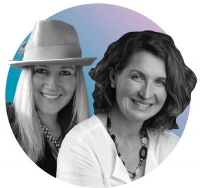MADISON MAGAZINE
START-UP CITY FEATURE
BY BRENNAN NARDI
"MADISON STARTUP KEEPS THOSE WHO WORK SOLO FROM BEING SILOED. THE JILLS CONNECTS INDEPENDENT CONTRACTORS".
I’d like to take this opportunity to thank Megan A.C. Boswell’s teenage daughter, who gave her mom and her mom’s business partner Corinne Neil tips on how to use Twitter. That’s where I stumbled upon THE JILLS OF ALL TRADES, read about the venture and discovered that it is a Madison-area startup.
Naturally, the smart and savvy duo eventually mastered the art of tweeting. I’m grateful for the ease and efficiency of social media in discovering unique, local people and products—and then making those one-on-one connections. I’m from Generation X and old enough to remember life before the digital age, when networking and community building happened via the newspaper and at Junior League. I also recall a time when an amazing concept like THE JILLS, an online platform for independent contractors to connect with companies that need highly skilled, on-demand talent, would have been dreamed up in a larger city, likely on a coast, and even more likely, a product of “the Jacks.”
Thankfully, Boswell found her way to the Midwest through American Girl. She spent 14 years as head of global design and development before launching a brand strategy and design business for two and a half years to allow more time with her kids. Neil enjoys a successful career as a curriculum and content developer. Unlike Boswell’s corporate career, Neil’s solo career offered a flexible schedule and a healthy life-work balance. One of the challenges for Neil was the time, energy and sometimes anxiety associated with landing the next gig, and the one after that. Also, freelance work can be isolating, and Neil began to yearn for a more networked and sustainable lifestyle, while still retaining the variety and autonomy she loves most. So she started talking to Boswell and other friends about what it might look like for all of them to thrive in their careers without sacrificing quality of life. A lightbulb switched on, and THE JILLS was born.
In 2015, THE JILLS focused on customer development and was accepted into the startup accelerator Madworks, where they put their ideas to the test in the company of peers and mentors. Madworks companies receive support through the University of Wisconsin–Madison’s Law and Entrepreneurship Clinic, a resource for fledgling companies without the capital to finance expensive but essential legal counsel.
Megan A.C. Boswell (left) and Corinne Neil foundedTHE JILLS to connect high-quality talent with great gigs
Each Madworks company receives a $5,000 grant from the Wisconsin Economic Development Corporation after completing the 10-week program. THE JILLS used it to launch a website with plug-in tools—and still have money in the bank. Armed with the tagline “Work Solo-Not Silo,” the company sells monthly ($35) and annual ($365, or a dollar a day) memberships to join THE JILLS community and gain access to an online roster of project-based talent, project opportunities, networking meetups, marketing and promotion and curated tips and trends. THE JILLS distinguishes itself in the marketplace with a broad talent spectrum (from writers and graphic designers to Ph.D.s, lawyers and software developers), no job bidding or transaction fees and direct communication between the Jill and the client. Both members and nonmembers can also earn cash rewards
for referrals.
What’s also sustainable and scalable, the founders hope, is the community-driven platform on which THE JILLS is built. The plan is to grow THE JILLS around the globe but anchor the membership to geographic hubs that promote team building and relationships. Future growth also includes a suite of administrative tools for members to manage their work more efficiently and effectively.




































